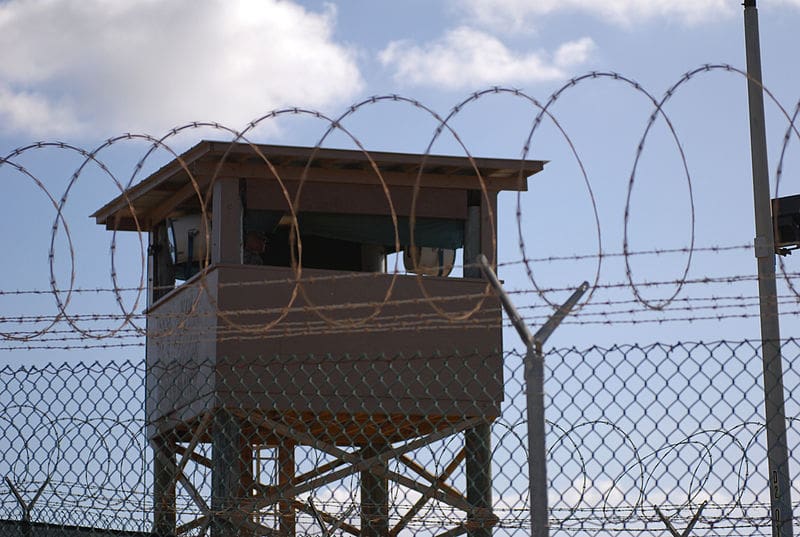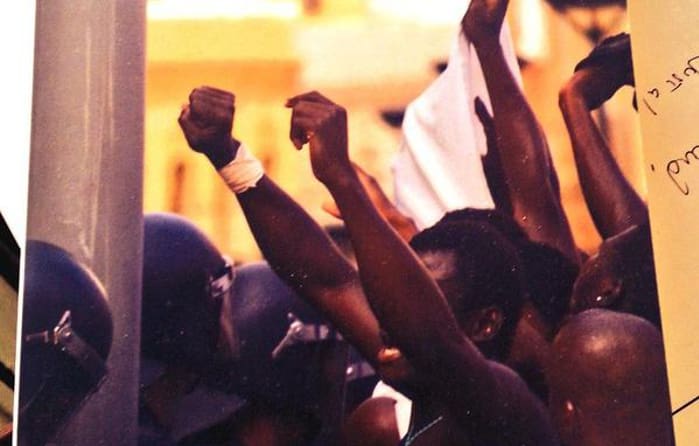Transcribed from the 28 February 2015 episode of This is Hell! Radio and printed with permission. Edited for space and readability. Listen to the full interview:
“This is the funny thing: when people don’t believe in anything, when they’re cynical about everything, they’re actually incredibly easy to manipulate.”
Chuck Mertz: Live from London, TV producer Peter Pomerantsev is author of Nothing is True and Everything is Possible: The Surreal Heart of the New Russia. Good evening, Peter.
Peter Pomerantsev: How are you doing?
CM: Great. Some news broke yesterday and I want to get your thoughts on it: former deputy prime minister Boris Nemtsov was shot and killed in Russia. He was to appear at an antiwar march Sunday in Moscow, against the war in Ukraine.
To you, what does this say—or does it say anything to you—about Vladimir Putin and his control of Russia?
PP: Well, one way of looking at Nemtsov’s incredibly tragic and sad death—obviously we don’t really have anything firm at the moment—is that he was killed by propaganda. You’ve got to understand, there have been posters with his face on them hung from major buildings by pro-Kremlin youth groups, saying, “This man is a national traitor.” He’s in every movie of hate broadcast on Russian pseudo-news, which say that he’s a CIA agent, a Satanist Mason, out to destroy the spiritual foundations of Russia. He was the constant target of a massive hate campaign.
Maybe that’s one way of looking at it. It’s both shocking and yet somehow utterly unsurprising.
CM: Right. And your book is about the media experience that you had while you were in Russia. You write about the amazing size of Russia, covering nine time zones and going from the Arctic to Central Asian deserts: “TV is the only force that can unify and rule and bind this country. It’s the central mechanism of a new type of authoritarianism, one far subtler than the twentieth century strains.”
I’ve always heard that there is a nostalgia within Russia—not for communism perhaps, but for authoritarian rule. Does that explain the embrace of Vladimir Putin?
PP: That’s certainly very much something the media plays on. It’s very hard to discern whether it’s authentic yearning or yearning that is forced through by incredibly efficient and coordinated propaganda. But there are several things that the propaganda dwells on. One of them is “We need a strong hand. Our country needs a strong hand. Without a strong hand we can’t cope.”
This works in the propaganda in various ways. One of the more counterintuitive moves that contemporary Russian propaganda does is—one of the biggest channels, NTV, shows non-stop how awful life in Russia is. Murders, corruption in the provinces, economic collapse. All with the underlying message, “we need a strong hand. We need a strong Kremlin to bring our country together.”
To what extent it’s a bottom-up nostalgia and to what extent Putin has simply managed to create this mythology that the country needs a strong authoritarian ruler—that’s a complicated thing to explore. But the media certainly does dwell on that.
CM: And that shows how fear sells. Here in the US, fear sells as well. How would you compare the way that fear sells in Russia to the way that fear sells in the West?
PP: Human emotions are the same everywhere. And this is not a new thing. But to make a comparison: imagine all you had was FOX News. That’s all you had. There is no NBC, ABC, CBS; none of that. Just 24-hour FOX News, on all the channels, from all the angles. And anyone who tries to oppose it ends up shot.
Media is about having differing voices in opposition to each other. But in the Russian system everything is scripted by the Kremlin every week. The heads of top TV channels meet inside the Kremlin and they’re given the scripts for the week: which stories they’re meant to cover, how they’re meant to cover them, who’s allowed on TV and who isn’t allowed on TV.
And also which subtle psychological buttons they’re meant to be pressing—trauma from the Second World War, trauma from the nineties. It’s done in a very coordinated way, from TV through print and all the way down to social media. It really is all about structures of control. That’s really the key thing.
Of course, one could take pretty much any move that Russian propagandists use and trace it back to something in the West. But the point is that it is centralized and focused; that’s what makes it qualitatively different. It’s also become a much more subtle and sophisticated game.
CM: How much do you think Russians are aware of this propaganda? Do they know that they are being misinformed, that they’re being misled, and they’re just shrugging and saying, “Of course?”
PP: Yeah. But actually this is another great innovation. Russian propaganda plays on cynicism a lot. For example, everyone knows that elections are faked. Everyone knows that they are a joke. Everyone knows that Putin will win. There’s not that much excitement before an election. Everyone knows the opposition is all nominated by the Kremlin. But the Kremlin fakes elections fairly openly, and is quite proud of this. The point is to intimidate people. “We can do any number we want. We can fake anything we want. Just accept it and move on.”
For a long time no one cared about politics in Russia. This is the deal the Kremlin had for you: everything’s going to faked—the news is fake, the elections are fake—however, you can go off and make a lot of money if you are as corrupt as the system wants you to be. And people kind of accepted that game.
Whenever a genuine political opposition to Putin starts to emerge through social media or through any kind of bottom-up movement, the first thing the Kremlin does is leak a story that actually the Kremlin is running them. The message is basically, “Don’t believe in anything. Everyone’s for sale. Everything is controlled by us. There’s nothing to see here, people, move away.”
But just because people are critically and intellectually aware that they are being lied to doesn’t mean they can’t be emotionally manipulated. So Kremlin TV isn’t just about news. Kremlin TV is non-stop talk shows and documentaries about conspiracies. Conspiracies everywhere. The CIA is out to get us, the Masons are out to get us. There are deadly fungi that are out to destroy Russia.
This is the funny thing: when people don’t believe in anything, when they’re cynical about everything, they’re actually incredibly easy to manipulate. They can be persuaded that yes, our leaders our corrupt and our politics are fake, but there is a hidden hand somewhere manipulating everything.
So this cynicism leads to conspiracies. Conspiracies are the main mode of pseudo-explanation on Russian TV for anything. In the case of the Ukrainian revolution, for example, they played on that cynicism very hard. They say on TV, “obviously you realize a bunch of Ukrainians couldn’t have staged a revolution, that’s ridiculous. It must have been the evil CIA.”
There’s some great research by Northeastern University—and this is about the West—showing how people who don’t believe in mainstream media are the most likely to swallow disinformation. So there’s a bit of a paradox there.
“We might be facing a global deluge of disinformation, and the information age might well turn out to be the disinformation age. In that sense, Russia might be the avant garde of a very dark future.”
CM: You quote someone you describe as one of the most famous political presenters in Russia saying, “We all know there will be no real politics in Russia under Putin, but we still have to give our viewers the sense something is happening. They need to be kept entertained. So what should we play with? Should we attack oligarchs? Who’s the enemy this week? Politics has got to feel like a movie.”
Cynicism aside, did that kind of honesty surprise you? And you write about how TV producers generally don’t mind giving up journalism for entertainment; did it surprise you how quickly people were willing to acquiesce to the Putin regime?
PP: To be honest—maybe because I’m a naïve person who still believes in the core principles of democratic liberalism—I still find it shocking. And things reached a new pitch during the Ukraine crisis. The news is now just basically fictionalized, in the sense that there are stories about Ukrainian soldiers crucifying a Russian child; there was a story about how Ukrainians give drugs to kids who then go out and shoot Russians. Stuff basically taken from the movies and put on during the news. As news, not as dramatizations.
Recently the deputy minister for communications was asked why there’s so much disinformation on Russian TV. And he said, “Look, it doesn’t matter. It really doesn’t matter. All that matters is that our ratings are high. People enjoy the way we present this, and that’s all that matters.”
That’s the thing that people keep on coming back to in Russia: that facts don’t exist, truth doesn’t exist as a concept, so therefore why don’t we just make stuff up? It’s all about who can be more emotive, who can be more entertaining and gruesome.
I still find that very, very shocking. The obvious parallel in America is Karl Rove’s legendary quote: he once told the New York Times in an interview that people in power could create new realities, and the little people on the ground just chase their realities, trying to decode them. And then they create new realities.
So this is clearly an international phenomenon, and we could look at various reflections of it in different parts of the world. In Russia they’ve just pushed the envelope a little bit further than any other place that I’ve encountered.
Maybe there’s a philosophical issue here, something in the postmodern philosophy that has been very fashionable for the last fifty years, which also tries to argue there is no such thing as truth; there are no such things as facts; all reality is a social construct; etcetera. Now we’re seeing how these ideas are finding their way into everyday politics, and it’s actually quite frightening. We might be facing a global deluge of disinformation, and the information age might well turn out to be the disinformation age. So in that sense, Russia might be the avant garde of a very, very dark future.
CM: This week, a website called Ukraine Today published this: “A Russian newspaper has leaked a Kremlin policy document that details Russia’s takeover of Ukraine. Novaya Gazeta has leaked the document, which it says was written by policy officials inside the Kremlin in the period between February 4th and 12th of last year, just before the Euromaidan massacre, and before the former president fled Ukraine. The document lists Russia’s takeover of Crimea, the need for a Russian PR campaign to win hearts and minds, and calls for a referendum in eastern Ukraine to give the appearance of legitimacy. Unlike much of Russian media, which is controlled by the Kremlin, Novaya Gazeta has a reputation for being independent and critical of the Kremlin. Since 2001, six journalists from the newspaper have been murdered. Last year, Novaya Gazeta was targeted by the Kremlin for publishing an exposé on Russian soldiers in Ukraine.”
So to what degree is there any kind of independent media in Russia? And how popular is it?
PP: Well, on TV, nothing. TV is very firmly controlled. The Kremlin has always tried not to drive dissenting voices underground but to co-opt them and give them a tiny and utterly pointless platform on which to speak. Novaya Gazeta has a tiny print run; it’s allowed a tiny little corner of the space. There’s a radio station, Ekho Moskvy [Echo of Moscow], that has a lot of pressure put on it but it’s allowed to exist in a little corner as well.
One of the biggest publications—of course it’s also very small—is called Snob Magazine, which is the Russian version of the New Yorker but is a Kremlin-approved liberal project because of the way it’s packaged. Of course it would never touch corruption or anything. It just does broad liberal critiques of Putin, accompanied by a lot of stuff about lifestyle which is quite elitist, quite Westernized. So it is very easy for the Kremlin to say, “Haha, look at these liberals! They’re not like ordinary Russians. They’re interested in their wine and skiing holidays.” The guy who sponsors it is Mikhail Prokhorov, a very flamboyant oligarch who went on to become the Kremlin-sanctioned liberal candidate and got 10% in the presidential elections.
When somebody does become dangerous—like Alexei Novalny, the protest leader who despite not being allowed on TV got 30% in the Moscow mayoral elections—then very quickly they’ll have a case opened against them and they’ll find themselves in legal trouble.
If a real threat emerges, they stamp down on it. But the tactic so far has been to co-opt, contain, and manipulate. And it’s been fairly effective.
CM: You write how “we saw a similar dynamic at work on the international stage in the final days of August, when an apparent Russian military incursion into Ukraine—and a relatively minor one at that—was made to feel momentously threatening. Putin invoked the need for talks on the statehood of southeastern Ukraine with language that seemed almost purposely ambiguous, leaving NATO stunned and Kiev intimidated enough to agree to a ceasefire. Once again the term Novorossiya, New Russia, made its way into Putin’s remarks, creating the sense that large territories were ready to secede from Ukraine when in reality the insurgents only held a sliver of land.”
So how much is the Ukraine war a result of Russian propaganda?
PP: Virtually all of it. It’s a war “hallucinated into reality,” in the words of whoever rights the big Economist pieces every week. It’s fairly incredible what they’ve managed to do. People are going around about a “civil war” in Ukraine; it’s all rubbish. They’ve been one country for twenty years with no conflict. Donbass, which is the place that “rebelled,” was always the Yanukovich heartland, but they always managed to strike some sort of deal with Kiev. There was no hint of violence for twenty years.
Then during Maidan the Kremlin started this incredible propaganda campaign. It doesn’t matter what the reality is that they’re talking about; it’s utterly contradicted all the time. “Ukraine doesn’t really exist. Ukraine is full of fascists.” Emotionally, it’s just scare stories and nightmares, and it doesn’t really matter that people can’t coherently explain why they’re taking up arms and starting a war—emotionally they’ve been inspired to do so.
So you see people taking up arms within Ukraine and you see people coming down from Russia convinced that they’re fighting the great CIA-Masonic-Zionist threat in Ukraine, and it’s quite stunning. At some point it starts to become the reality because the Ukrainians push back. They start bombing. And once the bombs start flying, that’s it. Hallucinated reality becomes real, because innocent people start dying—people’s reasons for war become a lot more real in that sense.
“Imagine Alex Jones were running your TV—your national TV stations, all of them at the same time. Then you get the world we’re talking about. You realize how great boring old CBS is after that.”
It’s absolutely incredible. They did it so quickly. They did it in a period of six months or so, just by starting one of the most vicious propaganda campaigns in history. That really is stunning.
The way Kremlin propaganda is working now, during the war period, is a lot like how a cult works. There’s non-stop conspiracies to break down critical thinking; false assurances; linguistic tricks that connect things up in a false way; this scratching away at emotional traumas (the humiliations of the 1990s and the Second World War are raised all the time; “the West is attacking us just like they did during the Second World War”). Then at the end there’s the glorious appearance of Putin and military victories to inspire some sort of emotional erection.
So it’s starting to operate like a cult. And our reaction is much like if we have friends who have gone into a cult: “I don’t believe this is happening to a normal person, that they believe some freak in California is the Messiah…” Something quite similar is happening, and very similar techniques are being used. And it’s petrifying, because it’s completely unclear about what the end results are going to be.
CM: You write, “The first thing Russian militias do when they take a town in east Ukraine is seize the television towers and switch them over to Kremlin channels. Soon after, the locals begin to rant about fascists in Kyiv and dark US plots to purge Russian-speakers from eastern Ukraine. It’s not just what they say but how they say it that is so disturbing: irrational spirals of paranoia, theories so elaborate and illogical one can’t possibly argue with them.”
This sounds like 9/11 conspiracy theorists. Does it all sound like the ravings of the most extreme conspiracy theorists?
PP: Yeah, and actually they use lots of the same American conspiracy guys. Those guys love international Russian TV and they’re on there all the time. So yeah, they do a lot of that.
But imagine that’s all there was. Imagine Alex Jones were running your TV—your national TV stations, all of them at the same time. Then you get the world we’re talking about. You realize how great boring old CBS is after that. Or the boring BBC. The ridiculously slow, patient collection of facts and rather squarish discussions. You realize just how much we need it.
Propaganda techniques aren’t inherently “Russian.” Propaganda techniques have been developed over centuries in different countries. If we’re looking from the American angle: the 1918 campaign to get America into the First World War is still taken as the birthplace of a lot of techniques of mass propaganda. Including the use of disinformation. That’s why Walter Lippmann wrote Public Opinion, to counteract that.
But generally if we get into these holes of propaganda, we then climb out of them. In Russia there don’t seem to be any signs of climbing out at all. If anything it’s being put on crack.
CM: What do you think is a greater threat to Europe? Real, actual weaponization by Russia and an actual invasion? Or the weaponization of information, where an invasion isn’t even necessary?
PP: It’s the latter. Not Russian but rather Chinese military theory is really into this idea of how you can bring a country to its knees without ever using official troops. Can you do it through a combination of economic warfare, information warfare, a little bit of terrorism, and destroy it without ever touching it?
And when you talk to people in the Baltics, the question is: can they bring Estonia or Latvia—or Bulgaria, for that matter—to its knees without ever actually invading? There’s a lot of Russian military theory about this. Whether it could work in practice, I don’t know. But authoritarian rulers are working out how they can use the information age for new forms of warfare.
We’re entering a century that’s going to be full of these wars of pure perception. Russian military theory states this openly. It says that the future of war is war of pure perception, fought purely through psychological means and in cyberspace.
The role of journalists is going to be very important. I think journalism will see a revival in this century as we begin to understand this new level of information and propaganda and manipulation that’s happening as a result of technological advances.
CM: Peter, there’s one question I still have to ask you before you go, and I apologize for going a little bit long. Here in the US, the Islamic State is the scariest thing that the media has been packaging to us for a very long time. Is Russia as much of a threat to Europe as the Islamic State?
PP: Well, it’s very, very different. Obviously Russia is a huge, nuclear-armed superpower; if it wants a war, it can make a lot more trouble. The Islamic State is an odd one. It’s very interesting to see that they are—a bit like Russia—pushing the envelope on propaganda. But coming from the other side, in a way: ISIS is augmenting its size and relevance through propaganda, while Russia often tries to disguise it.
CM: Thank you very much, Peter, I really appreciate you being on the show with us this morning. Good luck with your book and enjoy the rest of your weekend in London.
PP: Alright then, bye!





